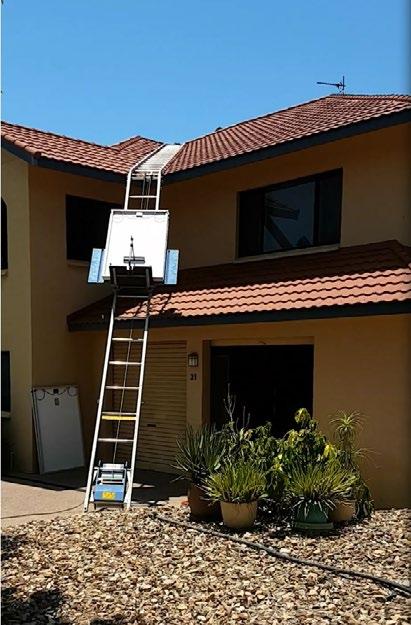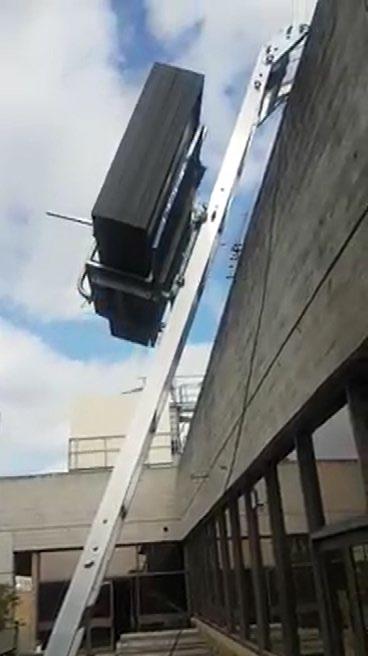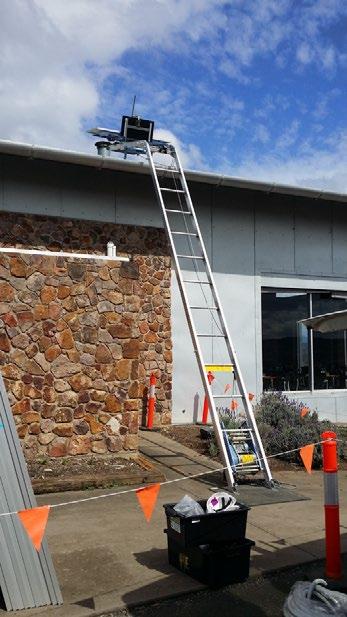
9 minute read
What are we teaching them?
WHAT ARE THEY TEACHING THEM?
THE rACE TO THE BOTTOM. CAN’T TEST. NO iDEA. NEVEr USED OHM’S lAW ONCE SiNCE i BECAME A TrADiE. WHAT ArE THEY TEACHiNG THEM? SOME pOSTS ON FACEBOOK FOrUMS HAVE prOViDED plENTY TO lAUGH AT, BUT USUAllY SOMEWHErE iN THErE, YOU’ll SEE A FEW COMMENTS liKE THESE. OFTEN, THE liNK TO TrAiNiNG iS MADE, BUT iS THAT THE CAUSE OF pOOr ElECTriCAl WOrK? WHAT iS MOrE iMpOrTANT, WHEN THE QUESTiON ‘WHAT ArE THEY TEACHiNG THEM?’ iS ASKED, iS WHO ArE ‘THEY’?
The arrangements for training apprentices have remained relatively unchanged since the 1970s. A four-year apprenticeship, attending college for one day a week or possibly in blocks, and then a capstone assessment of varying complexity to finish the training. Equally, without much change, are the fundamentals taught in class. The big laws of electrical, Ohm’s, lenz’s and Kirchhoff’s, are as true today as they were when proven. So, what’s changed?
What may surprise you, is the amount of time an apprentice spends with their employer. When you look at the time spent with them, versus the time spent in college, what would seem a reasonable amount? Does that stack up in the real world?
Currently, a four-year apprenticeship contract equates to about 8,320 hours. We can split that between on-the-job and off-the-job, essentially, the employer and registered training organisation (rTO) split. On average there is about 1,000 hours of off-the-job training over the four years. So, approximately 12% of the time is spent off-the-job, at an rTO. The remaining 88% is with the employer.
leave taken during the apprenticeship can be offset against the rising number of apprentices who have completed a pre-apprenticeship, so that split of 12/88 is relatively stable.
Back to the ‘they’ question. Training is not solely the responsibility of the rTO. A training plan and its related contract of training, has three major stakeholders: the rTO, the employer, and most importantly, the apprentice. How can we all contribute to successful apprentice outcomes, where Facebook forums have less content to laugh at, and more to applaud?
The rTO, whether industry or TAFE, is required to employ trainers that meet three criteria. They must hold the appropriate training qualification, and the relevant qualification they teach. The third, and a vitally important factor, is that both require currency, meaning every trade teacher must maintain their knowledge and understanding of current trade practice.
When we factor back in that an apprentice spends 88% of their time with their employer, who has the most influence in developing their trade skills? The trade teacher, who sees them for 12% of their apprenticeship? Or the mentor, coach, supervisor, manager and colleagues who see them 88% of the time? So, we should ask ourselves - are we all up to date with the latest rules, regulations and practices in industry?
Make no mistake, the apprentice is central. Their desire to learn and be taught is paramount in the success of their apprenticeship. Yet they can only be taught by us, the rTO and employer. in this case, the ‘they’ is us, both parties. Together we teach apprentices the theory and fundamentals at college and the hands-on, real-world skills with the employer. if we all do our part, we will see a marked improvement in Capstone pass rates, less ‘dodgy electrical’ and a secure future for our trade.
Steve Hall
General Manager, College of Electrical Training






GOLD STANDARDS ARE THE KEY TO WORLDSKILLS SUCCESS
NECA WOUlD liKE TO CONGrATUlATE ANDrEW DUFFiElD, A FOrMEr ElECTriCAl GrOUp TrAiNiNG (EGT) ApprENTiCE AND COllEGE OF ElECTriCAl TrAiNiNG (CET) STUDENT, WHO WAS AWArDED THE GOlD MEDAl FOr THE 2021 WOrlDSKillS AUSTrAliA NATiONAl CHAMpiONSHip FOr ElECTriCAl iNSTAllATiON.
Throughout his apprenticeship, Andrew demonstrated a keen interest in challenging himself and furthering his skills. His dedication paid off, taking him through the regional competitions into the WorldSkills Australian National championships, where he displayed his talents and the quality of his work.
We were pleased to speak to Andrew about his outstanding accomplishment.
What did you enjoy most about the competition?
The people really made the competition for me – i made awesome friends and contacts. it’s very easy to just “get through” your apprenticeship, so it was a breath of fresh air to be around like-minded people who wanted to challenge themselves. The competition was amazing and pushed me further than i ever thought i could go.
Can you share some of the challenges you faced?
Training for the competition was no easy task. less than three months out, i didn’t know how to bend a steel conduit or do a simple stop-start program for a smart relay. it took a lot of discipline and sacrifice to learn the skills needed for the competition. i spent weeks training at college in the evenings after ten-hour days at work.
i was fortunate to have many great mentors, who took time out of their lives to teach me. My supervisor Jake, and project Engineer rahman, spent hours with me after work teaching me how to write programs and wire up motor control circuits. At college the lecturers, especially Michael Cox, pushed me to produce the highest-quality work in a timely manner.
How did it feel to be announced as the national winner and the first in WA’s history?
it was honestly one of the most amazing and rewarding things in my entire career as a sparky. The whole experience was a once in a lifetime opportunity that developed me as a tradesperson. To top it all off with the win was the cherry on top.

What are some of your best memories from your time as an apprentice?
i have always been an advocate for EGT. For me, the flexibility to move through different placements and projects was the best thing. i had the chance to be part of the electrical works at Adventure World on their newest ride, commercial, residential and industrial maintenance, new builds, renovations, mining and finished it all off with industrial-commercial construction. i created relationships with multiple companies and their staff who are still close friends and contacts to this day.
What kind of work are you doing now as a graduate tradesperson?
i’ve been in the mechanical-electrical sector for just over a year and i’m loving it. We are working across the perth Metronet project and have almost finished commissioning our installations. i didn’t expect to be doing such large-scale work and now i don’t think i ever want to do anything else.
What are your plans for the future?
in the short term, i’m working towards being a leading Hand in my current company’s mechanical-electrical sector. This is a new area for the company – it’s growing fast and is something i’m seriously passionate about. long term, i’d like to see myself as part of project management/development. The work i’m doing now offers a large spread of skills and knowledge to learn and it’s something i want to dive into head first.
Do you have any advice or recommendations for apprentices looking to be involved in WorldSkills?
Go for it and go for it hard. put everything you can into it and make the sacrifices required to be the best you can. The partying and fun times will still be there afterwards. You can go back to it all knowing you’ve done everything you can and hopefully with a win under your belt. Get out there and surprise yourself. push yourself further than you can imagine, and set the standards higher than you, or anyone around you thinks you could achieve. Your standards will determine your success!
PUBLIC LIABILITY
YOU HAVE A CERTIFICATE BUT IS YOUR POLICY COVERING YOU?
NOT All pUBliC liABiliTY pOliCiES ArE CrEATED EQUAl. WHilST A CErTiFiCATE OF CUrrENCY WiTH YOUr COMpANY NAME AND liMiT OF liABiliTY MiGHT MEET YOUr liCENSiNG rEQUirEMENTS AND CUSTOMEr rEQUESTS, iT iS iMpOrTANT TO MAKE SUrE THE ACTUAl COVEr BEiNG prOViDED COVErS YOU FOr All THE WOrK YOU DO.
What’s the problem?
The important document to review is your policy Schedule. This document outlines all the particulars of your policy. For NECA members the critical, but often overlooked, details are the business description or business activities. At Willis Towers Watson (WTW), through our years of experience working with NECA on the NECAGuard program, we know that the work electrical contractors provide is hugely diverse and constantly evolving. insurance companies, however, often use very narrow definitions when issuing policies, which may result in an activity you perform not being covered.
Insurer’s definition of an electrician
insurance companies use the Australian and New Zealand Standard industrial Classification (ANZSiC) as developed by the Australian Bureau of Statistics when assessing risk and rating policies.
The commonly used ANZSiC code for electricians and electrical contractors is 32320 Electrical Services (https://tinyurl. com/necaguard). This code includes common activities like electric lights, wiring and appliance installation as well as telecommunication cable or wire installation. it notably though specifically excludes fire and/or security system installation, any work on distribution or transmission lines and appliance repair. To further complicate things, other common activities for NECA members such as heating, ventilation, and air-conditioning (HVAC), switchboard manufacturing, thermographic scanning, fire safety assessment, mechanical contracting, automation and excavation are not mentioned usually because there are other ANZSiC codes that better apply. We have recently noted some insurers now consider photovoltaic (pV) solar installation needs to be noted separately despite traditionally falling under appliance installation.
What can go wrong?
if you perform an activity that is excluded or is better described by another code, you may have a fight on your hands with your insurer in the event of a claim. if the activity in question relates to a code that an insurer would usually charge a higher rate for or not cover at all, the insurer may look to exclude cover. You may also be in breach of contract if you are required to take out public liability, but the policy taken out doesn’t actually cover you for the activities you have been contracted to perform.
What should I do?

To avoid these issues WTW recommends using an insurance broker. They should be able to assess your business and determine what activities need to be declared to the insurer and noted on the policy. They will also be able to assist in the event of a claim should any issues arise. Under our NECAGuard program, we take particular care to expand the business description so that activities that could be outside the usual description are specially stated on the policy itself. if there is doubt, we note it down. This creates far greater certainty for the activities you are covered for. if your insurer won’t list activities on the policy, then at the very least you should retain written correspondence in some form to confirm the insurer or broker is aware of your activities.
Protect your business
Over 500 NECA members choose to insure their businesses through NECAGuard, an insurance offering that has been designed specifically for electrical contractors.
To find out how you can obtain tailored insurance coverage along with sound and personalised advice, email contact 1800 335 014 for more information or scan the Qr code.










